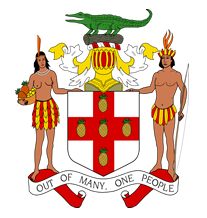The island - discovered by Christopher COLUMBUS in 1494 - was settled by the Spanish early in the 16th century. The native Taino, who had inhabited Jamaica for centuries, were gradually exterminated and replaced by African slaves. England seized the island in 1655 and established a plantation economy based on sugar, cocoa, and coffee. The abolition of slavery in 1834 freed a quarter million slaves, many of whom became small farmers. Jamaica gradually increased its independence from Britain. In 1958 it joined other British Caribbean colonies in forming the Federation of the West Indies. Jamaica gained full independence when it withdrew from the Federation in 1962. Deteriorating economic conditions during the 1970s led to recurrent violence as rival gangs affiliated with the major political parties evolved into powerful organized crime networks involved in international drug smuggling and money laundering. Violent crime, drug trafficking, and poverty pose significant challenges to the government today. Nonetheless, many rural and resort areas remain relatively safe and contribute substantially to the economy.
Jamaica is a parliamentary democracy under a constitutional monarchy and part of the Commonwealth realm.
Members:
Resources
Displaying 31 - 35 of 77Real Estate (Dealers and Developers) (Code of Ethics) Regulations, 1998.
These Regulations implement provisions of the Real Estate (Dealers and Developers) Act by prescribing ethical rules of conduct for Real Estate Dealers and Developers.
Implements: Real Estate (Dealers and Developers) Act. (2006)
Real Estate (Dealers and Developers) Act.
This Act establishes the Real Estate Board and provides rules for the registration and operation of real estate dealers, real estate salesmen and real estate developers. It also provides for certain matters regarding development schemes and for inspection by real estate inspectors. Engaging in real estate business for purposes of this Act includes lease of land and the management of land. The functions of the Board shall be to regulate and control the practice of real estate business, the disposition of land in development schemes and the operation of such schemes.
Real Estate (Dealers and Developers) Regulations.
These Regulations implement provisions of the Real Estate (Dealers and Developers) Act in respect of applications for licences for dealers, registration of dealers, the Register of Real Estate Dealers and Real Estate Salesmen, fees, and the report required pursuant to section 29 of the Act.
Implements: Real Estate (Dealers and Developers) Act. (2006)
Amended by: Real Estate (Dealers and Developers) (Amendment) Regulations, 2010. (2010-03-10)
Parish Councils Act (Cap. 271).
This Act makes provision for the constitution of Parish Councils in Jamaica, defines their functions and powers, and provides with respect to their election, organization and administration and other relevant matters. Parish Councils shall be corporations and shall be successors to Municipal Boards, the Boards of Parochial Roads Commissioners and Parochial Boards constituted under the Parochial Boards Law, 1885.
Parochial Water Works Charges Act.
This Act stipulates that a Parish Council of a parish shall charge for the supply of all water from the water works in such parish in accordance with rules to be made by such Council, provided that the Minister may at any time, and from time to time, by Order, provide for the free distribution of water to specified persons or class of persons. The Act also provides for the definition of public land belonging to waterworks and for the punishment of trespass of such land.


